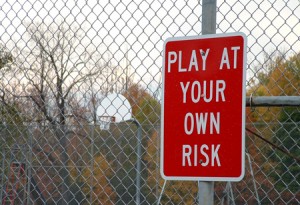Why did I leave Autism out of the title?
Well, that’s because there are far more risks to every childbirth than just Autism. There’s the chance of a still birth, cancer, down syndrome and a whole host of other disorders, illnesses, ailments and can have a child growing up in a hospital somewhere. In some cases, a death sentence. Some children are born with cancer that kills them 2 or 3 years after birth.
What a harsh way to start a blog post right? I know. But I think that sometimes we Autism parents can forget the realities of our situation… there are people out there who have it so much worse.
The reason for this post is that many people have concern over recent findings in a study that I covered earlier today on this blog: Autism Study of The Month: Recurrence Risk for Autism Spectrum Disorders: A Baby Siblings Research Consortium Study
 The risks of any younger sibling
The risks of any younger sibling
That being said, that there are a large number of risks, you have to realize that any and all of those birth risks are possible in all births. That means, the first child you have has a risk.
Knowing that, any child you have afterwards has an increased risk.
How do I know that?
Well, if there’s a 10% risk of a disorder at childbirth… then having 2 children means you have a 10% chance and a 10% chance.. a 20% chance.
That’s actually not quite right, satistically but for the argument of this article, it’s close enough.
You essentially double your chances by having a second child because you took the risk twice. That increases every time you have another child.
That’s for anything and everything… not just Autism.
What does it say when you don’t take the risk?
So you don’t want to take the risk of having a second child with Autism? Have you ever asked yourself: “Why is that?”
Let’s not pretend that having children with Autism is not hard and it certainly does cost a lot… we all know that.
But is that the real reason? Or is there something more to it? Let me put it this way: If you did have get pregnant a second time and discovered the child would be born with Autism, would you have an abortion?
Take some time to really think about it… is there some level of denial there? What does this say about your acceptance of your child with Autism?
Conclusion
For me personally, I love my son with Autism, not despite Autism. I think he’s amazing and has taught me a lot more in 6 years than I did in the 30 years prior.
Having a second child with or without Autism just does not seem like a risk to me.
I’ve had a few people on Twitter ask me what I thought of the recent findings… they asked me if I would take the risk or avoid the risk.
My response was this:
Decide whether or not to have another child with your heart, not your fears.
Ask yourself if you love your child. Ask yourself if you love your family. Ask yourself if you want to add another beautiful child to your family. Ask yourself what you heart is telling you.
Weigh the pros and cons, I’m not saying that there are no financial responsbilities or unforeseen risks that may arise but be aware that those finances and risks are always there, regardless of siblings or studies.
If no one had children for fear of the risks.. there would be no children.











